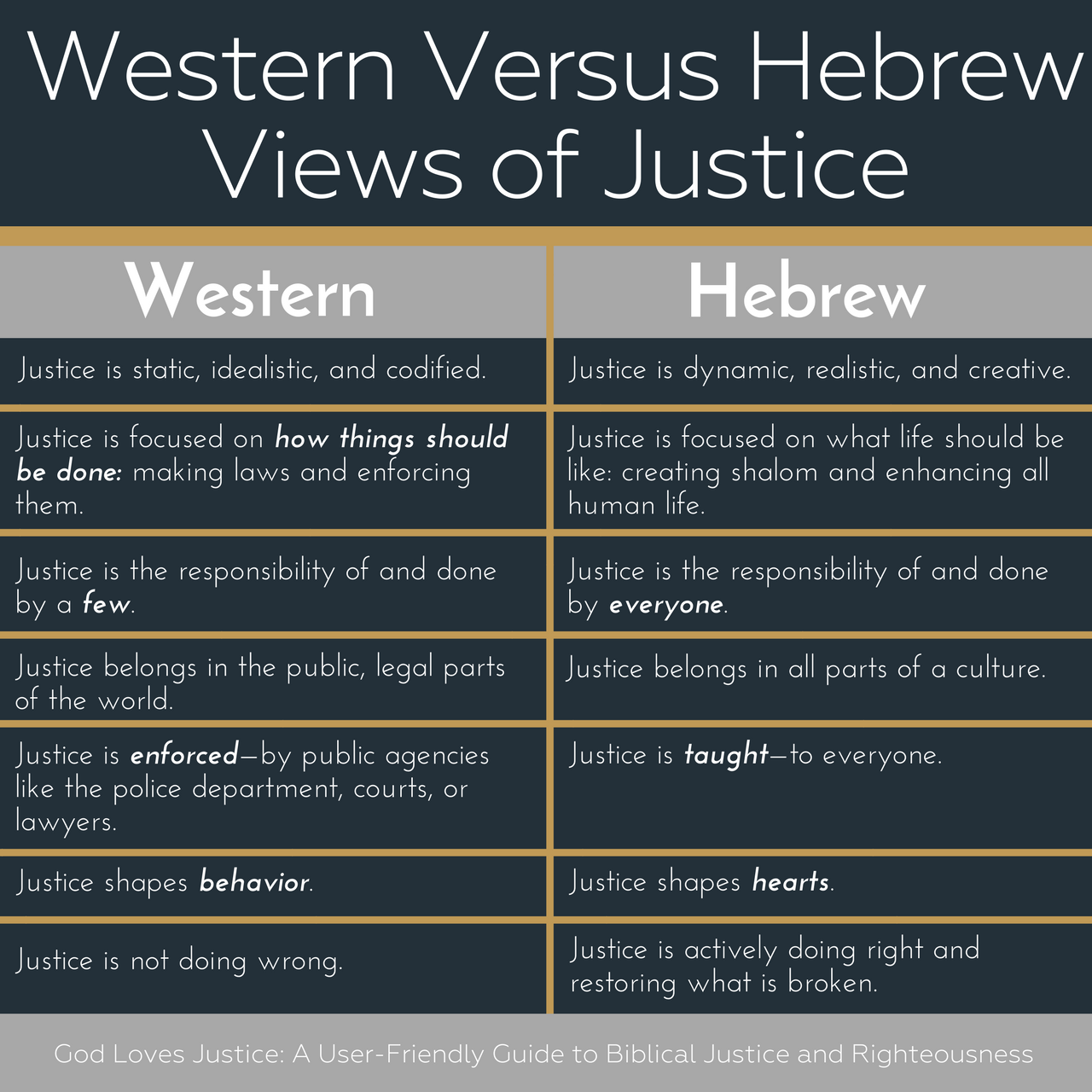Part of the challenge of learning about biblical justice is that our Western-ish views of justice are so different from Hebraic views from the time the Bible was originally written in. When an American Christian hears about justice, the images that we think of probably things like police officers, punishment, and courtrooms (and maybe a great TV drama about all those things). Unfortunately, that can make us reject doing justice now because we think of it through our Western-ish lenses. If God were to love our Western-flavored justice, then that would make Him a law-obsessed, punishment-loving judge. That is so far from what we know about God from the New Testament, so therefore we reject doing justice as Christians out of a genuine desire to reflect the Bible. But that is not at all the right image of a justice-loving God, or how we as Christians should do biblical justice.
So how can we change our Western-ish-flavored views of justice to a more biblical view? A helpful place to start is to get an overview of how different the Hebrew views of justice are compared to the Western.
A summary of the ways that the Western-ish and Hebraic views of justice are different
.
Western views of justice are primarily focused on how things should be done—laws, rules, and what should happen when laws are broken. In Hebrew thought, justice is focused on what life should be like.[i] Justice in the Hebrew world was concerned not just with laws, but with enhancing all human life, especially the social world. That meant justice applied to all relationships—between a ruler and his subjects, between the weak members of a community and the strong, and between institutions of the nation of Israel and citizens.
The Hebrew word that sums up “what life should be like” is shalom. That word usually shows up as “peace” in our English Bibles, but the meaning in Hebrew is more than simply the lack of conflict. Shalom comes from a root word that means “to be complete” or “to be sound.”[ii] Shalom is a peace that comes from everything being complete and whole, so there it can be translated also as security, well-being, or prosperity.[iii] The purpose of justice in Hebrew society was to restore and sustain shalom.[iv] In particular, those with the least amount of power needed special protection. This is why the Old Testament contains many reminders that Israel must do justice to the poor, widow, immigrant, and orphan. And “doing justice” meant not only “not doing wrong,” but also actively doing right and restoring what is broken.[v]
Another major difference between justice in the Bible and our modern views of justice is that in our world, justice has to be enforced by institutions like the police force, courts systems, and prisons. This gives rise to the impression that doing justice is the responsibility of only a few people. If something is broken and it’s not our fault, then we commonly assume we don’t have to do anything to fix it. In the biblical world, however, justice was done by everyone and was everyone’s responsibility. Because of that, justice was taught not merely enforced.[vi] People took ownership of the shalom and wholeness of their community; and, if something was wrong, they worked to right it, even if it wasn’t their fault. When you look at the law given by God to Israel, especially in the book of Deuteronomy, you can see how this education looked. The laws are not given line by line in a strict code; they are backed up with teaching and encouragement.[vii] God intended the entire culture of Israel to learn and teach how to do justice in a way that shaped their hearts as well as their behavior.
(And to learn more about how different the biblical and Western views of justice are, check out this blog post.)
UPDATE: This is now available as an episode on the God Loves Justice Podcast. You can listen on Spotify and Apple Podcast.
[i] Schwarzschild, Steven S. “Justice.” Vol. 2 of Encyclopedia Judaica, 2nd Edition. Edited by Fred Skolnik. Jerusalem: The Jerusalem Publishing House/Thomson Gale, 2007. (578-579)
[ii] Carpenter, Eugene E. and Philip W. Comfort. “Peace.” In Holman Treasury of Key Bible Words: 200 Greek and 200 Hebrew Words Defined and Explained. Nashville, TN: Broadman & Holman Publishers, 2000. (135)
[iii] Gesenius, Wilhelm, and Samuel Prideaux Tregelles. Gesenius’ Hebrew and Chaldee Lexicon to the Old Testament Scriptures. Bellingham, WA: Logos Bible Software, 2003. (שׁלוֹם)
[iv] Schneider, W. “Judgment.” Vol. 2 of The New International Dictionary of New Testament Theology. Edited by Colin Brown. Grand Rapids, MI: Zondervan, 1986. (362-367); Mafico, Temba L. “Just, Justice.” Vol. 3 of Anchor Bible Dictionary. Edited by David Noel Freedman et al. New York: Doubleday, 1992. (1127-1128)
[v] Morris, Leon. The Biblical Doctrine of Judgment. Grand Rapids: Eerdmans, 1960.
[vi] Houston, Walter. Contending for Justice: Ideologies and Theologies of Social Justice in the Old Testament. London: T & T Clark, 2006. (107, 131)
[vii] Ibid., 107.

